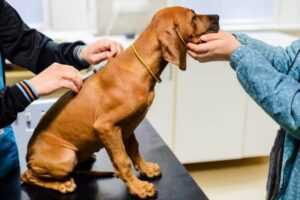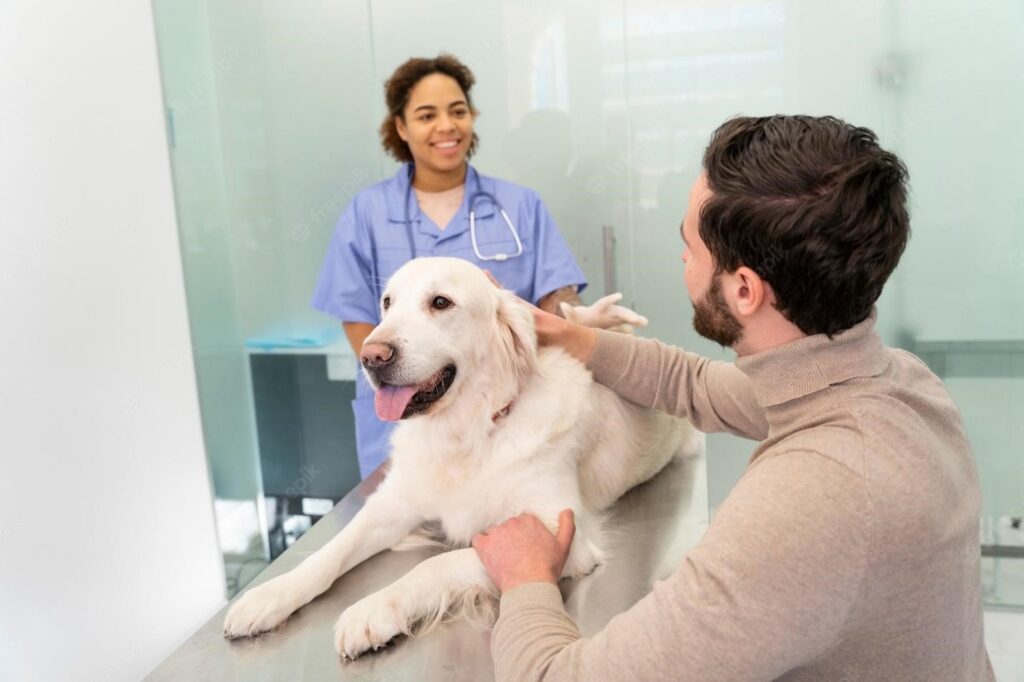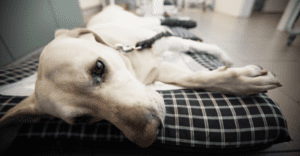Parvovirus, commonly known as “parvo,” is a highly contagious and potentially fatal disease that affects dogs. It attacks the digestive system and the immune system, causing severe vomiting, diarrhea, dehydration, and suppression of the white blood cell count.
Dogs with parvo may refuse to drink water or eat due to the intense pain and discomfort they experience in the gastrointestinal tract. As a result, they can become rapidly dehydrated, which can lead to life-threatening complications and make recovery even more challenging.
It’s essential for pet owners to understand the importance of early recognition and treatment of parvo. Preventive measures, such as vaccination and proper sanitation, can help reduce the risk of infection and spread of the virus.
If a dog is suspected of having parvo, prompt veterinary attention is crucial to improve the chances of survival and recovery.
In this article, we will provide an in-depth explanation of the symptoms and impact of parvo on a dog’s ability to drink water or eat, as well as the best ways to provide supportive care and treatment.
What is Parvovirus and how does it Spread?

Parvovirus is a highly contagious and deadly disease that affects dogs. It’s spread through the feces of an infected dog, which makes it very dangerous for people who have contact with their mouths or paws.
Parvoviruses can survive in water for up to six months, so if you’re feeding your dog after they’ve been sick with parvo (or if they eat food off the floor), make sure any bowls are thoroughly cleaned before refilling them with clean water.
If this isn’t possible because they’ve been sick for some time—and especially if you live near another animal owner—you might want to consider getting rid of all those dishes until further notice!
Is It fatal to Dogs?
The answer is yes. It is a life-threatening disease for dogs, and can cause them to dehydrate, develop shock and heart failure. If left untreated, parvovirus can lead to death within 24 hours of infection.
If you have a dog that has been exposed to parvo virus—and we recommend that you get him in contact with your vet immediately—he may not show any symptoms until after 48 hours have passed since his last exposure
What are the Symptoms of Parvo in Dogs?

The symptoms of Parvo in dogs typically include:
- Vomiting: Repeated and severe vomiting is a common symptom of Parvo in dogs.
- Diarrhea: Dogs with Parvo often develop watery, bloody diarrhea, which can lead to dehydration.
- Loss of appetite: Most dogs with Parvo lose their appetite and refuse to eat or drink.
- Lethargy and weakness: Parvo can cause a decrease in energy levels and weakness, making it difficult for the dog to stand or walk.
- Dehydration: Severe vomiting and diarrhea can cause rapid dehydration in dogs with Parvo, which can be life-threatening if left untreated.
- Fever: Some dogs with Parvo may develop a fever as their body tries to fight the virus.
- Abdominal pain: Dogs with Parvo may experience abdominal pain and tenderness due to the inflammation in the digestive system.
How Long does it Take for a Dog to Show Signs of Parvovirus?

Parvo is a virus that can be spread through the air and through contact with an infected dog. Before you get worried, it’s important to know that your dog isn’t sick in any way until they show symptoms. This means it can take up to two weeks for symptoms to show.
In fact, some dogs might not even get sick at all! The most common signs of parvovirus include vomiting and diarrhea (sometimes both at once), which can happen within 24 hours of infection.
However, some dogs develop serious complications such as dehydration or organ failure—and these are usually seen within two weeks after infection has occurred.
What should I do if my Dog has Parvo?
If you suspect that your dog has Parvo, it is important to seek veterinary care immediately. Here’s what you should do:
Isolate your dog:
Isolating your dog if it has Parvo is crucial to prevent the spread of the virus to other dogs and animals. Parvo is highly contagious and can easily spread through contact with infected feces, vomit, or contaminated surfaces.
By keeping your dog isolated, you reduce the risk of spreading the virus and help to protect other dogs and animals in your community.
Consider Electrolyte Supplements:
Electrolyte supplements can be an important part of the treatment plan for dogs with Parvo.
Electrolytes, such as sodium, potassium, and chloride, are essential for maintaining fluid balance in the body. Vomiting and diarrhea can cause rapid electrolyte loss, leading to dehydration and other complications.
Your veterinarian may recommend electrolyte supplements to help replace lost electrolytes and maintain fluid balance in your dog’s body. There are several forms of electrolyte supplements available, including oral fluids, injectable fluids, and intravenous fluids.
Your veterinarian will recommend the best form of electrolyte supplement for your dog based on its individual needs and the severity of its condition.
Disinfect Contaminated Surfaces Using Parvo-Specific Cleaners:
The use of parvo-specific disinfectants is highly recommended for cleaning contaminated surfaces. These disinfectants are specifically designed to kill the parvo virus and are effective at preventing its spread.
It’s important to follow the manufacturer’s instructions carefully when using these disinfectants, as different products may have different requirements for application and dwell time.
When cleaning contaminated surfaces, it’s important to wear protective clothing, such as gloves and a mask, to prevent the spread of the virus. It’s also important to thoroughly clean and disinfect any tools or equipment used in the cleaning process.
Follow your veterinarian’s instructions:
Your veterinarian will diagnose your dog’s condition and recommend a treatment plan. Follow the plan as instructed and keep all appointments with your veterinarian.
Provide supportive care:
Supportive care for dogs with Parvo is designed to help the dog through the recovery process and manage the symptoms of the illness. This may include providing fluids and electrolytes to prevent dehydration, controlling vomiting and diarrhea, providing nutrition, and administering medications to relieve pain and discomfort.
It is important to work closely with a veterinarian to determine the best course of supportive care for your dog.
Practice good hygiene:
Parvo is highly contagious, so it’s important to practice good hygiene to prevent the spread of the virus. Wash your hands thoroughly with soap and water after handling your dog or any contaminated items, and clean and disinfect any areas where your dog may have been.
Should I Force My Puppy to Eat When She Has Parvo?

No, you should not force feed a puppy with parvo. Parvovirus, commonly known as parvo, is a highly contagious and potentially fatal viral illness that primarily affects dogs.
If your puppy has been diagnosed with parvo, it is important to provide appropriate veterinary care, which may include hospitalization and treatment with medications, fluids, and other supportive care as needed.
Forcing food or water into a sick dog can be harmful and can increase the risk of aspiration, which occurs when food or fluid enters the lungs instead of the stomach.
In addition, dogs with parvo often have a decreased appetite and may not be able to eat or drink due to the nausea and vomiting associated with the disease.
If you are concerned about your puppy’s health, I recommend that you contact your veterinarian immediately for advice and treatment options. Your veterinarian can help you determine the best course of action for your puppy and provide you with the support you need to care for your pet during this difficult time.
FAQs:
Q: How can I prevent my dog from getting Parvo?
A: The best way to prevent your dog from getting Parvo is to have it vaccinated. Keeping your dog isolated from other dogs and avoiding contact with contaminated surfaces can also help to reduce the risk of infection.
Q: Can Parvo be prevented from reoccurring in a dog?
A: Parvo can be prevented from reoccurring in a dog by having it vaccinated and avoiding contact with contaminated surfaces. Keeping your dog healthy and maintaining good hygiene can also help to reduce the risk of reoccurrence.
Q: Can Parvo be transmitted from dogs to other animals?
A: Parvo can be transmitted from dogs to other animals, including cats and ferrets. However, it is species-specific, meaning that it can only infect dogs and not other species of animals.
Q: What are the long-term effects of Parvo in dogs?
The long-term effects of Parvo in dogs can vary, depending on the severity of the illness and the promptness of treatment. Some dogs may experience permanent damage to the digestive system or other organs, while others may make a full recovery.
Q: Can a dog that has had Parvo be vaccinated again?
A: Yes, a dog that has had Parvo can be vaccinated again. It is recommended to consult with a veterinarian to determine the best course of action, as some dogs may need to wait several months before being re-vaccinated.
